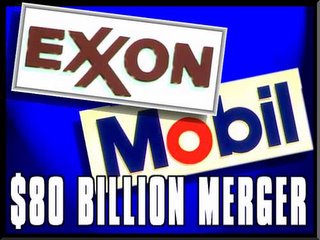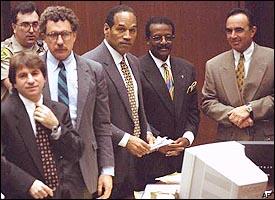WHO IS BRIBING YOUR CONGRESSMEN AND SENATORS- AND WHAT THEY GET IN RETURN
 This merger brought in $10 billion in profits last quarter- a world record built on three months of price gouging!
This merger brought in $10 billion in profits last quarter- a world record built on three months of price gouging!"All of the major oil companies, foreign and domestic, have now announced their earnings: ExxonMobil third-quarter earnings up 75 percent. ConocoPhilips up 89 percent. British Petroleum up 34 percent. Shell up 68 percent.
"All together, the 29 major oil and gas firms in the Standard and Poors 500 stock index are expected to earn 96 billion dollars this year -- up from 68 billion dollars last year and 43 billion dollars in 2003.”
“Suppose you were an idiot. And suppose you were a member of Congress. But I repeat myself.”
Mark Twain, a Biography.
Gasoline pump prices double, then triple in less than 12 months. Meanwhile, earlier this year Congress passed an energy bill that will provide billions in tax breaks to oil companies. Georgians might wonder why their elected representatives and senators voted to provide tax breaks to the likes of Exxon Mobil, which just recorded a record breaking quarterly profit of ten billion dollars. A glance at the Political Action Committee (PAC) contributions (courtesy of OpenSecrets.org) to Georgia’s Congressmen and Senators provides the answer.
Oil Companies’ bribes to Georgia’s Senators and Congressmen
Senator Johnny Isakson’s (R) vote on the energy bill was purchased with $5,000 from Chevron Texaco’s PAC. Kerr-McGee, an Oklahoma based oil and gas exploration company, bagged Senator Saxby Chambliss (R) with $3,000 in 2003 (when Chambliss was still 5 years away from a re-election bid, but received over $365,000 in PAC bribes to influence his future votes). Georgia’s 8th District Congressman Lynn Westmoreland (R) received a paltry $1,000 from Chevron Texaco, but it was enough to buy his vote, also. Exxon Mobil purchased Congressmen Nathan Deal’s (R) and Phil Gingrey’s (R) votes for $1,000 each. However, Gingrey previously was paid $3,000 for his vote in the 2004 election, proving once again that the old adage holds true- an honest Congressman is one who, once bribed, stays bribed.
Max Burns (R), who hopes to win back his 13th Congressional District seat from Democrat John Barrow, was worth $10,000 to Exxon Mobil in the 2004 election cycle, while Clay Calder (R) received $7,000. It’s no accident that the letter “R” follows most of the donations. Federal Election Commission records show that Exxon Mobil spent $585,674 bribing House Republicans during the 2004 election, but only $27,250 (less than 5% of their total) bribing House Democrats to do their bidding. The same pattern held true with Senators, as Exxon Mobil spent $105,770 to purchase Republicans’ votes, but only $9,550 to corrupt Democrats.
HMO’s won’t let Georgians have a single payer plan
If you’re a Georgia State employee and you’re upset that your health insurance is about to become virtually worthless because the new insurance company has failed to negotiate deals with local hospitals and medical practices, don’t fret. Congress will come to your aid with a single payer plan that will eliminate all of the problems with non-participating medical providers- just as soon as you pony up the necessary bribes. Here’s your competition: Aetna’s HMO and Humana HMO separately wrapped up Nathan Deal’s vote for $1,500 each. If Max Burns gets re-elected, Aetna still has him on the hook for $1,000 from his 2004 race. In 2004, Humana spent $88,000 securing Republicans' votes in the House (compared to only $17,500 spent bribing Democrats, who can’t even get a bill to the House floor for a vote- but hey, one day in the future, they may be instrumental in blocking unwanted regulations). But to get your single payer plan, you’d better exceed $2.5 million greasing Washington palms, as that was the total HMO’s spent buying Congress in 2004.
Why your prescription drug bills won’t go down anytime soon
And that 2003 prescription drug bill that rewarded pharmaceutical companies at the expense of seniors and local governments strapped with Medicaid costs? Chalk that one up to drug giants like Johnson and Johnson ($1,000 bought Sanford Bishop (D)) and Pfizer ($10,000 to bribe Max Burns, $2,000 to Nathan Deal, $1,000 to Phil Gingrey, $5,000 for civil rights pioneer John Lewis (D), $1,000 for Charles Norwood (R), $10,000 to Tom Price (R), $10,500 to David Scott (D), $2,000 to Saxby Chambliss. and $5,000 to Johnny Isakson). Pfizer alone spent $800,000 in the 2004 election cycle to buy votes, and drug companies as a whole spent almost $8.5 million- $6 million on Republicans. Of course, when the benefits of their largesse are returned a thousand fold- they are reaping billions from a bill that will cost American taxpayers over $500 billion over the next 10 years- the investment seems paltry indeed.
It’s hard to decide which is more embarrassing: that our Congressmen and Senators can be bribed by special interests bent on bankrupting Americans, or that they come so cheap.





